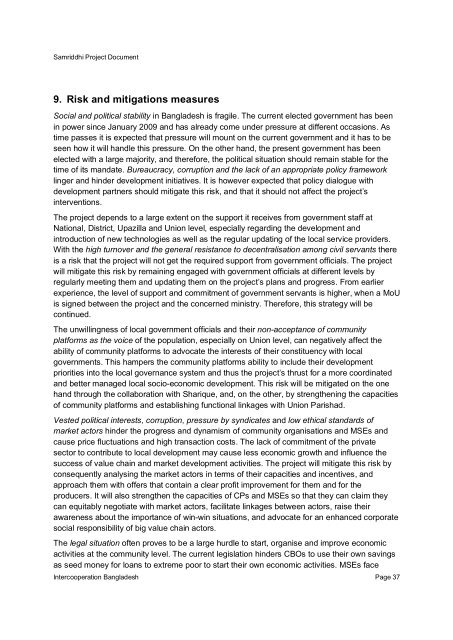Samriddhi
Samriddhi
Samriddhi
Create successful ePaper yourself
Turn your PDF publications into a flip-book with our unique Google optimized e-Paper software.
<strong>Samriddhi</strong> Project Document<br />
9. Risk and mitigations measures<br />
Social and political stability in Bangladesh is fragile. The current elected government has been<br />
in power since January 2009 and has already come under pressure at different occasions. As<br />
time passes it is expected that pressure will mount on the current government and it has to be<br />
seen how it will handle this pressure. On the other hand, the present government has been<br />
elected with a large majority, and therefore, the political situation should remain stable for the<br />
time of its mandate. Bureaucracy, corruption and the lack of an appropriate policy framework<br />
linger and hinder development initiatives. It is however expected that policy dialogue with<br />
development partners should mitigate this risk, and that it should not affect the project’s<br />
interventions.<br />
The project depends to a large extent on the support it receives from government staff at<br />
National, District, Upazilla and Union level, especially regarding the development and<br />
introduction of new technologies as well as the regular updating of the local service providers.<br />
With the high turnover and the general resistance to decentralisation among civil servants there<br />
is a risk that the project will not get the required support from government officials. The project<br />
will mitigate this risk by remaining engaged with government officials at different levels by<br />
regularly meeting them and updating them on the project’s plans and progress. From earlier<br />
experience, the level of support and commitment of government servants is higher, when a MoU<br />
is signed between the project and the concerned ministry. Therefore, this strategy will be<br />
continued.<br />
The unwillingness of local government officials and their non-acceptance of community<br />
platforms as the voice of the population, especially on Union level, can negatively affect the<br />
ability of community platforms to advocate the interests of their constituency with local<br />
governments. This hampers the community platforms ability to include their development<br />
priorities into the local governance system and thus the project’s thrust for a more coordinated<br />
and better managed local socio-economic development. This risk will be mitigated on the one<br />
hand through the collaboration with Sharique, and, on the other, by strengthening the capacities<br />
of community platforms and establishing functional linkages with Union Parishad.<br />
Vested political interests, corruption, pressure by syndicates and low ethical standards of<br />
market actors hinder the progress and dynamism of community organisations and MSEs and<br />
cause price fluctuations and high transaction costs. The lack of commitment of the private<br />
sector to contribute to local development may cause less economic growth and influence the<br />
success of value chain and market development activities. The project will mitigate this risk by<br />
consequently analysing the market actors in terms of their capacities and incentives, and<br />
approach them with offers that contain a clear profit improvement for them and for the<br />
producers. It will also strengthen the capacities of CPs and MSEs so that they can claim they<br />
can equitably negotiate with market actors, facilitate linkages between actors, raise their<br />
awareness about the importance of win-win situations, and advocate for an enhanced corporate<br />
social responsibility of big value chain actors.<br />
The legal situation often proves to be a large hurdle to start, organise and improve economic<br />
activities at the community level. The current legislation hinders CBOs to use their own savings<br />
as seed money for loans to extreme poor to start their own economic activities. MSEs face<br />
Intercooperation Bangladesh Page 37
















